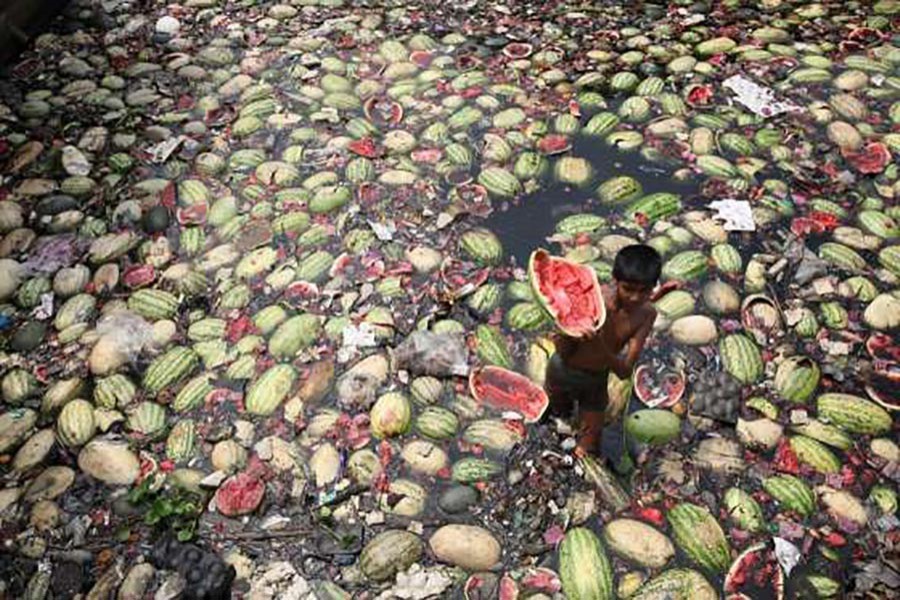
Published :
Updated :

Experts at a webinar on Tuesday said Bangladesh incurs food loss during production, handling and storage stage mainly due to lack of technology, infrastructure and awareness opposite to developed nations which have more food waste at retail and consumption stage.
The Food and Agriculture Organisation (FAO) data of 2012 showed that Bangladesh loses 30 per cent cereal, 35 per cent fish and 45 per cent from farm to distribution level.
According to the data of 2010, post-harvest loss of fruits and vegetables in Bangladesh is 22-44 per cent amounting to Tk 34.42 billion or $490 million.
More than one billion tonnes of food per year are never consumed in the world where one in nine people are still undernourished.
Effective measures are needed to be taken to reduce food loss and waste against the backdrop of the reality that the number of people affected by hunger has been slowly on the rise since 2014, and tonnes of tonnes edible food were lost or wasted every day.
These were revealed at a half-day webinar on 'food loss and waste in the context of Bangladesh'. Press Institute of Bangladesh (PIB) arranged the webinar with the financial and technical assistance from Food and Agriculture Organization (FAO) Bangladesh.
Agapi Harutiunyan, Senior SDG Specialist (Food Loss and Waste) Meeting the Undernutrition Challenge (MUCH), FAO, delivered a presentation on 'Introduction to Food Loss and Waste in the Context of Food and Nutrition Security' at the webinar.
In her presentation, she mentioned that the percentage of food loss after harvesting and during transport, storage and processing stood at 13.8 per cent globally, amounting to $400 billion in a year while the percentage of food waste at retail and consumption stage was yet to be estimated.
"When food is lost or wasted, all the resources that were used to produce this food, including water, land, energy, labour and capital go to waste,"Agapi also mentioned.
Kamrul Hasan, a horticulture professor at Bangladesh Agricultural University, Mymensingh, delivered another presentation on food loss and waste in Bangladesh.
Mr Kamrul mentioned that Bangladesh was one of the top ten rice and tropical fruit and rice producing countries. Lack of technology, infrastructure and awareness are the main causes of food loss here.
He suggested that actual data on food loss and waste is required to take effective actions. Also there is a need of national food loss reduction strategy like Canada and European Union, good practices, quality and safety of food and good agricultural practice to reduce food loss.
Food secretary Nazmanara Khanum delivered speech as the chief guest while Robert Simpson, FAO representative in Bangladesh and also representative, European Union Bangladesh and AssuntaTesta, Program Manager, Food and Nutrition Security, EU Delegation to Bangladesh, delivered opening remarks at the webinar as special guests.
Naoki Minamiguchi, Chief Technical Adviser, Meeting the Undernutrition Challenge (MUCH) Project, FAO, delivered vote of thanks with Zafar Wazed, Director General, PIB chaired the discussion.
Ms Agapi said central and Southern Asia is on top regarding food loss. Globally, there is 38 per cent food loss during harvesting and processing stage. Food insecurity can be addressed if early-stage food loss can be reduced.
"Major limitation is data availability. Data collection process is very costly. Only 23 countries have data on food loss. Only 4.41 per cent losses are officially reported," she said.
Globally, 25-30 per cent of all food produced is lost. One in nine persons do not have access to food per day. But sustainable development goals 12.3 has a target to reduce food loss and wastage by 50 per cent by 2030.
msshova@gmail.com


 For all latest news, follow The Financial Express Google News channel.
For all latest news, follow The Financial Express Google News channel.